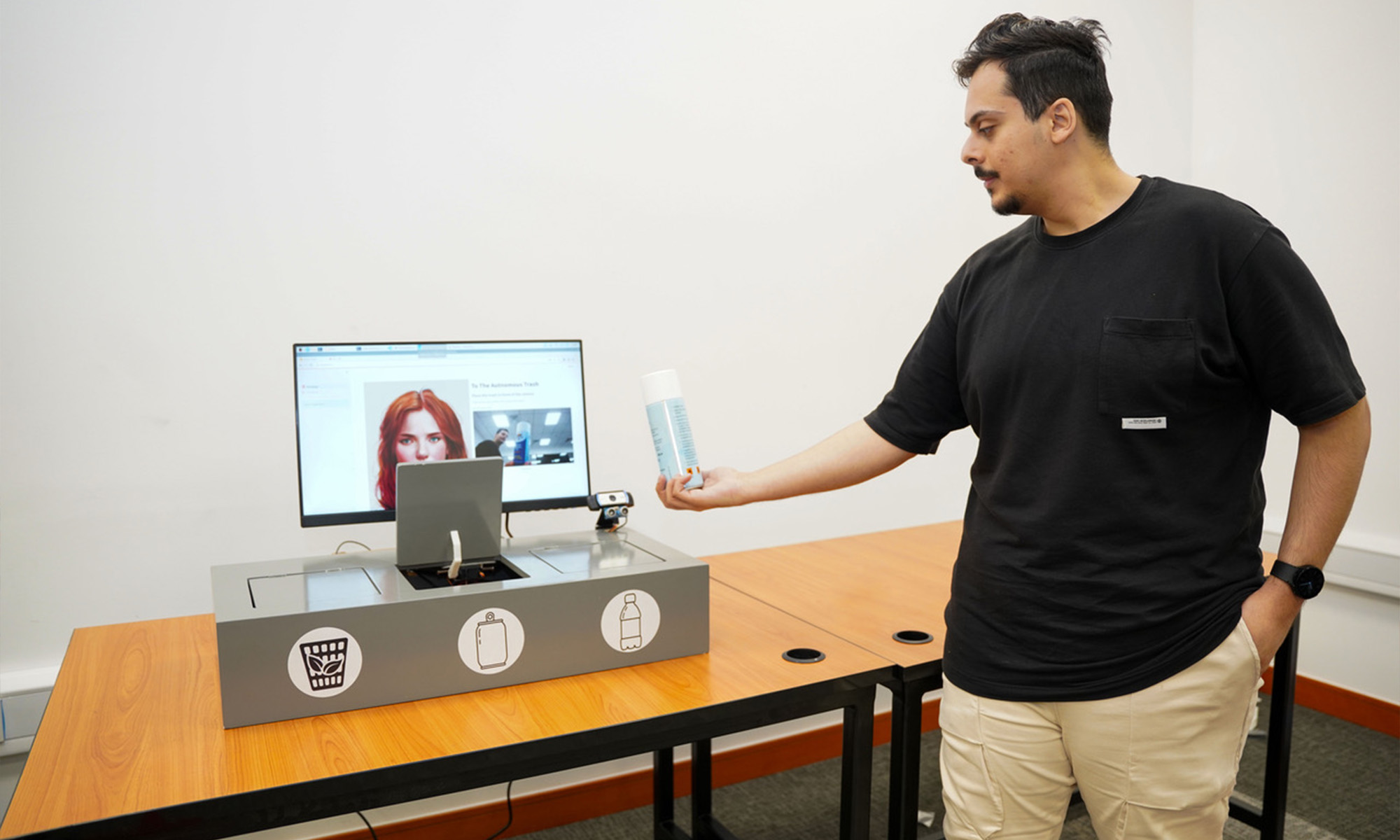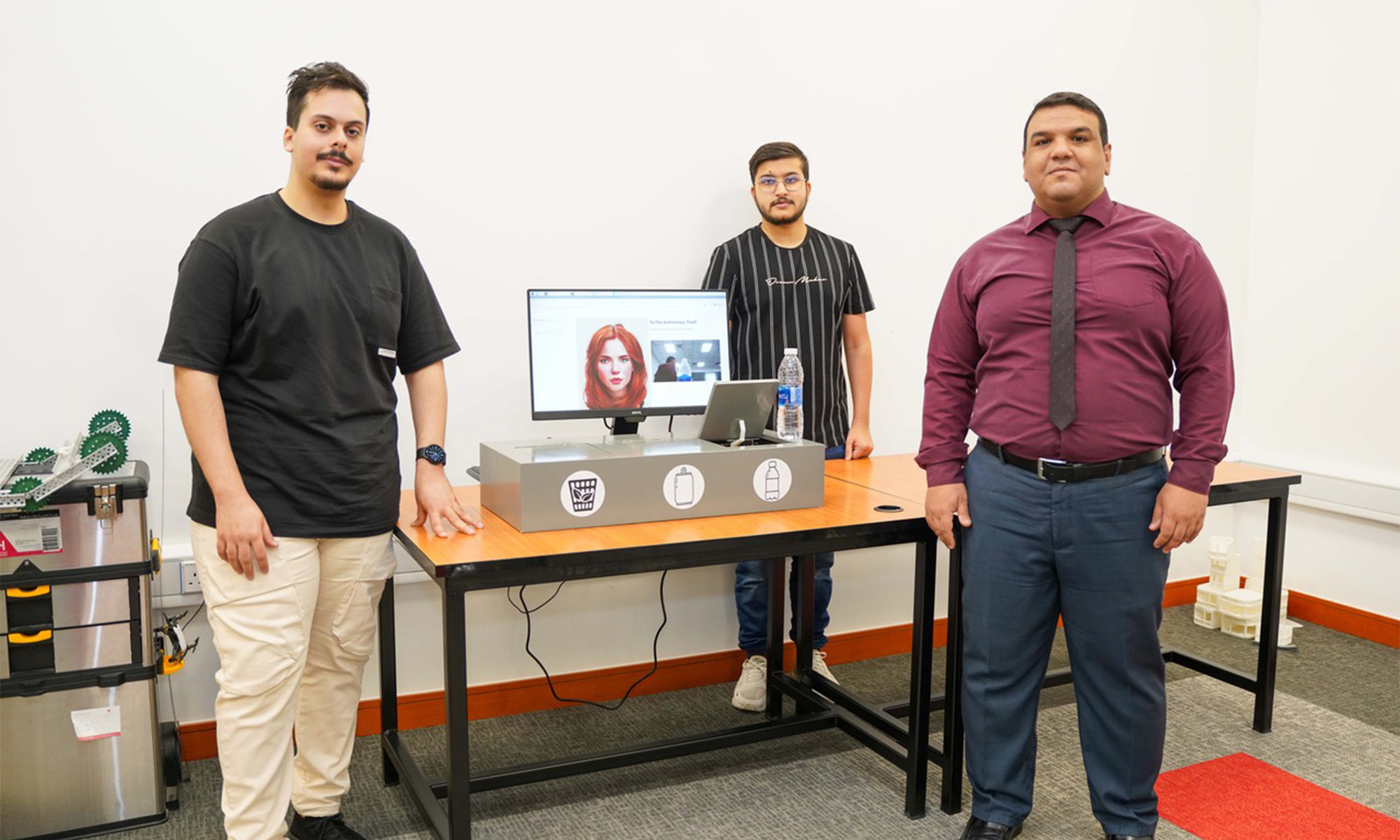News
Canadian University Dubai Students Create Smart Garbage Bin
The AI-driven household waste sorter uses “social robotics” to improve refuse management.

Canadian University Dubai (CUD) students have developed an innovative solution for sorting household waste. The system uses artificial intelligence, mechatronics, and so-called “social robotics” to swiftly and accurately sift through garbage. Known as the Social Robot Garbage Classifier, the project is a collaboration between students from the School of Engineering, Applied Science and Technology, and the Department of Public Health.
The idea for the smart garbage bin was formulated initially by Computer Network Engineering major Jehad Al Jaghoub, who explained, “Often people will not sort recyclable materials, or will accidentally place items in the wrong bin. Our goal is to improve the outcome of recyclable garbage sorting and, ultimately, to see these smart bins installed across Dubai. The mechatronics system uses sensors, allowing the robot to interact with users and understand their waste disposal needs. Precision-engineered actuators then translate this input into actions, ensuring that trash is correctly sorted and discarded”.

Co-creator and Public Health major Abdullahi Suleiman added: “The camera-based waste detection system uses advanced image recognition algorithms to identify items swiftly and accurately, enabling bottles, cans, and other recyclables to be identified with remarkable precision. This advanced system minimizes errors, guaranteeing that waste is accurately sorted and disposed of, significantly contributing to sustainable waste management”.
The university students’ prototype waste management system will soon compete in two regional innovation competitions, including the Institute of Engineering and Technology GCC Robotics Challenge, which showcases solutions for socially interactive robotics.
Also Read: Air Taxis Fly Over Jerusalem As Israel Creates Airspace Network
The students are supported in taking their creation to competitions by CUD Assistant Professor Dr. Salih Rashid Majeed, who summed up the project by saying, “This smart garbage bin is a remarkable innovation at the intersection of social robotics and mechatronics system design and represents the university’s strategy to harness the power of artificial intelligence to deliver sustainable practices. The social aspect of the robot creates an intuitive and user-friendly waste disposal experience that has the potential to reshape waste management as we know it”.
News
Rabbit Expands Hyperlocal Delivery Service In Saudi Arabia
The e-commerce startup is aiming to tap into the Kingdom’s underdeveloped e-grocery sector with a tech-first, locally rooted strategy.

Rabbit, an Egyptian-born hyperlocal e-commerce startup, is expanding into the Saudi Arabian market, setting its sights on delivering 20 million items across major cities by 2026.
The company, founded in 2021, is already operational in the Kingdom, with its regional headquarters now open in Riyadh and an established network of strategically located fulfillment centers — commonly known as “dark stores” — across the capital.
The timing is strategic: Saudi Arabia’s online grocery transactions currently sit at 1.3%, notably behind the UAE (5.3%) and the United States (4.8%). With the Kingdom’s food and grocery market estimated at $60 billion, even a modest increase in online adoption could create a multi-billion-dollar opportunity.
Rabbit also sees a clear alignment between its business goals and Saudi Arabia’s Vision 2030, which aims to boost retail sector innovation, support small and medium-sized enterprises, attract foreign investment, and develop a robust digital economy.
The company’s e-commerce model is based on speed and efficiency. Delivery of anything from groceries and snacks to cosmetics and household staples is promised in 20 minutes or less, facilitated by a tightly optimized logistics system — a crucial component in a sector where profit margins and delivery expectations are razor-thin.
Despite the challenges, Rabbit has already found its stride in Egypt. In just over three years, the app has been used by 1.4 million customers to deliver more than 40 million items. Revenue has surged, growing more than eightfold in the past two years alone.
Also Read: Top E-Commerce Websites In The Middle East In 2025
CEO and Co-Founder Ahmad Yousry commented: “We are delighted to announce Rabbit’s expansion into the Kingdom. We pride ourselves on being a hyperlocal company, bringing our bleeding-edge tech and experience to transform the grocery shopping experience for Saudi households, and delivering the best products – especially local favorites, in just 20 minutes”.
The company’s growth strategy avoids the pitfalls of over-reliance on aggressive discounting. Instead, Rabbit leans on operational efficiency, customer retention, and smart scaling. The approach is paying off, having already attracted major investment from the likes of Lorax Capital Partners, Global Ventures, Raed Ventures, and Beltone Venture Capital, alongside earlier investors such as Global Founders Capital, Goodwater Capital, and Hub71.






















